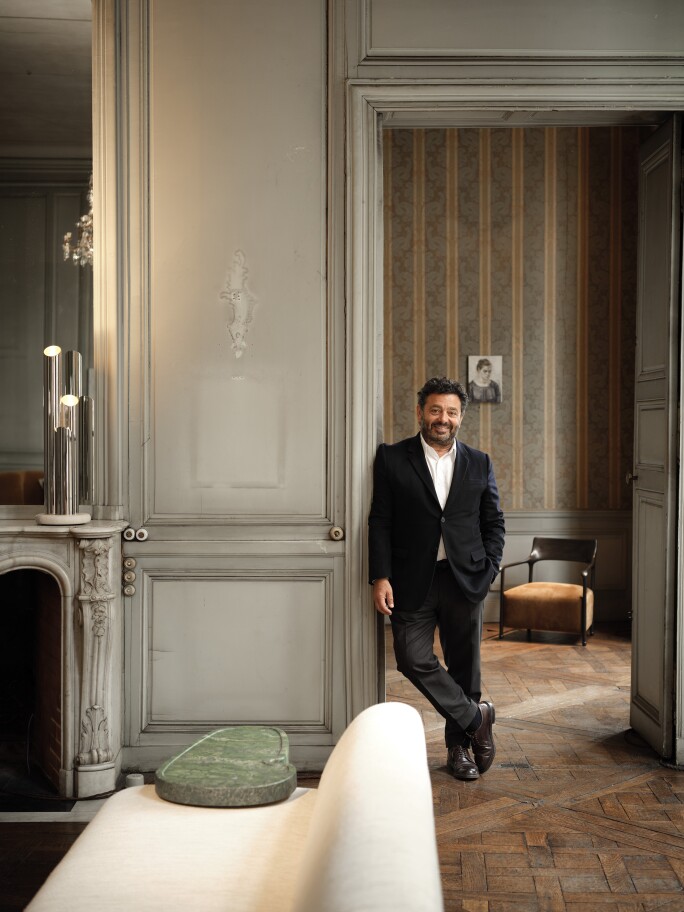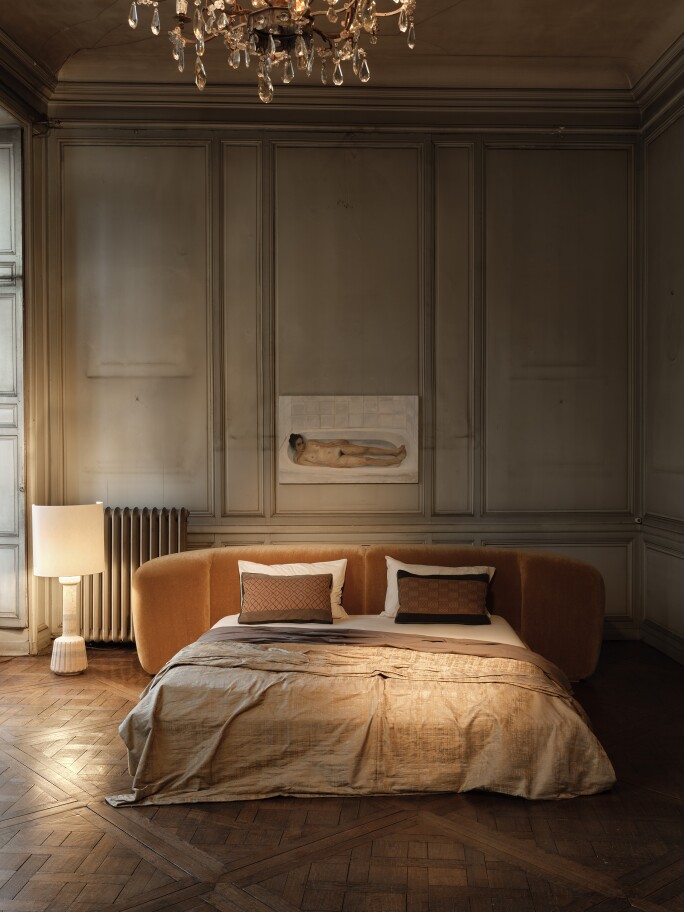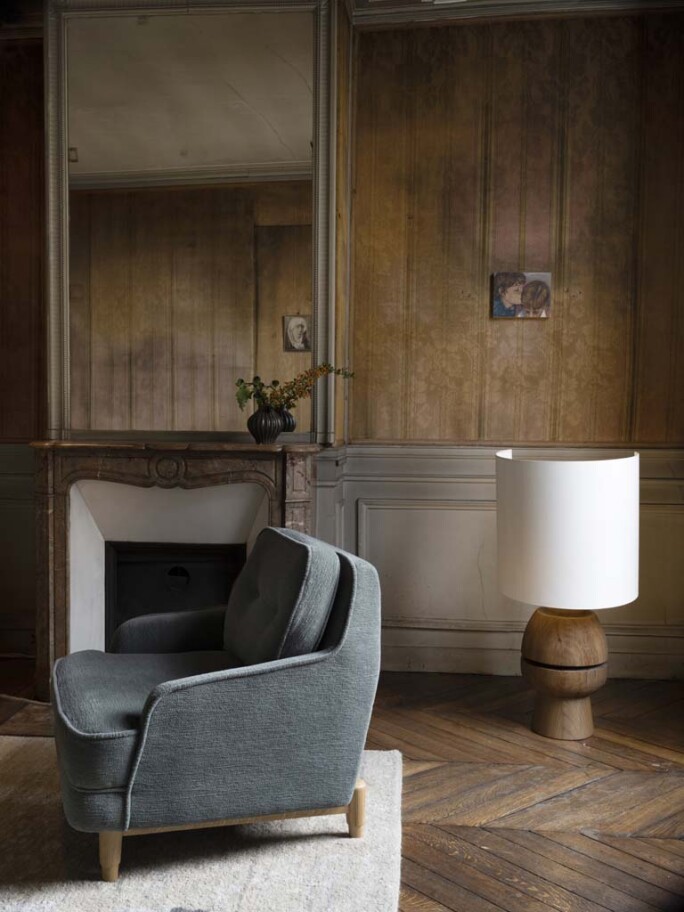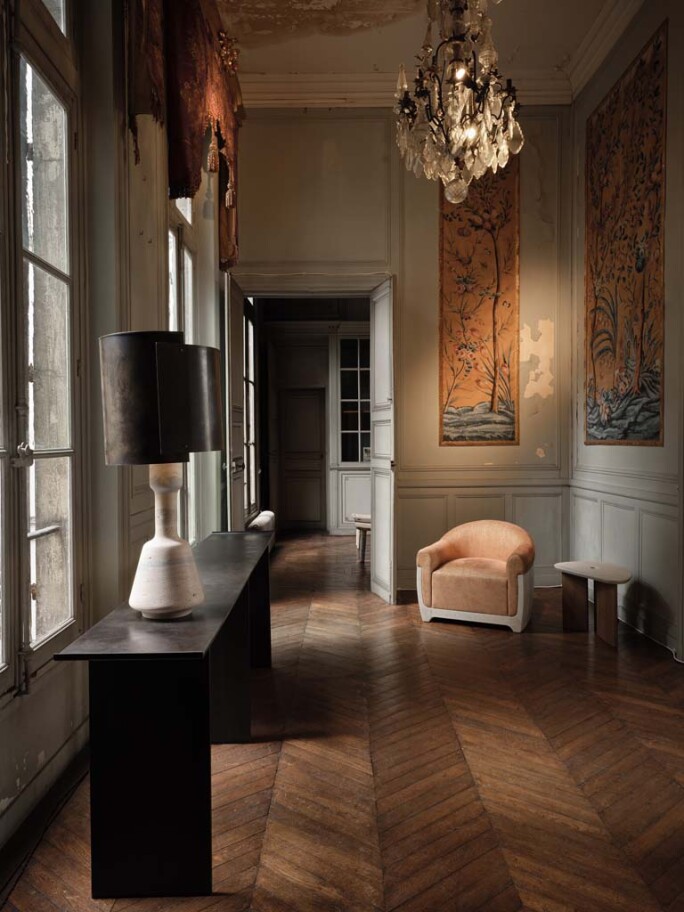
A n aristocratic townhouse in Paris was the scene, last October, for the gathering of an interesting crowd — the elite of the design world was out in force for a preview of the first furniture and lighting collection by one of its own, the interior architect Charles Zana. The beautifully faded rooms of the 18th century Hôtel de Guise with their tall windows, soft grey panelling and parquet de Versailles floors were kept almost empty to allow the understated forms of Zana’s elegant pieces — a huge curving sofa, a monumental bronze console — to make maximum impact.
Over his 30-year career as an interior architect, Zana has occasionally designed pieces of furniture when needed for specific projects, but this collection of 60 new and revised pieces is the first time his own vision for furniture and lighting has been united, and the effect is memorable. Zana has kept the tones subdued and the materials luxurious. His signature bronze calanque coffee table, like three superimposed weather-worn rocks, is there, alongside sturdy lamps in marble and stone, gently rounded armchairs, a slim stained-oak chair with thick woven-leather seat, a travertine wall lamp and a vast bed, its elephantine curves clad in ginger velvet, appropriately named “Teddy”. Zana says the collection is a return to his first love — furniture.

Zana was born in 1960, in Sousse, Tunisia, but his parents went to live in Paris two years later. His father, who worked in publishing, was passionate about modern design, and the young Charles, the only one of the three children to share this passion, accompanied him to museums and bookshops.
“We had plastic furniture, and pieces by Gae Aulenti and Poul Kjærholm at home”
“Those were the Pompidou years,” says Zana. “The era of modernity, of Courrèges and Cardin. We had plastic furniture, and pieces by Gae Aulenti and Poul Kjærholm at home.”

None of his school friends in the Parisian suburb of Vincennes had seen anything like it. The young Charles even had a Mathieu Matégot console in his bedroom. His father was a friend of the now legendary gallerist François Laffanour, an early champion of such designers as Charlotte Perriand and Jan Prouvé, and the first piece Zana bought for himself, aged 20, was from Laffanour — a 1950s Venini glass vase in the shape of a teardrop.
This was a prophetic purchase, as Zana admits to being obsessed with vases to this day; he owns more than 300, many by the Italian designers Ettore Sottsass and Andrea Branzi from the 1980s.
With such early training, Zana arrived at the Beaux-Arts school in Paris to study architecture fully prepared. He adored life in St Germain, where he still lives today, but on graduating in 1985 he left for New York, to work for a design firm specialising in luxurious interiors, and retail projects for clients such as Louis Vuitton. It was there he realised that interior architecture was his true passion. Returning to Paris two years later, he worked for another luxury firm, before setting up on his own in 1990.

These days Zana’s clients are very private and very loyal, and nearly all are serious art collectors.
His ability to make interiors calm and luxurious, where a certain balance and orderliness reigns, interiors where, as he says, “the art supplies the wow factor”, is what keeps them returning to him.
While current private projects include houses in Sardinia, Greece, New York and Corsica, it is his public works — including the offices of Condé Nast Paris, hotels and restaurants in St Tropez and St Barths and showrooms for Goyard and Cartier — that have made him a design world celebrity. “My style is a mix of classical references and modernity,” he says. “I design in straight lines, then soften them with soft rounded furniture”, as his preview at Hôtel de Guise showed perfectly.
Charles Zana’s designs are now on sale at Charles Zana Mobilier Galerie, 13 Rue de Seine, 75006 Paris. Monday to Friday 11am–6pm, +33 (1)45 48 05 25, czm@zana.fr
Cover image: The Ispahan table, with its Persian red travertine top and legs in patinated bronze, is paired with strap leather and stained oak Warton chairs. Above it is the Archipel chandelier, made from patinated bronze and with a height-adjustable chain. Photo: Vincent Leroux. Courtesy: Charles Zana 2021